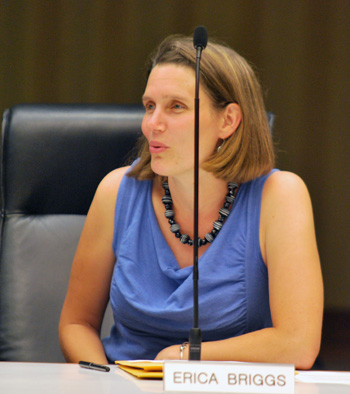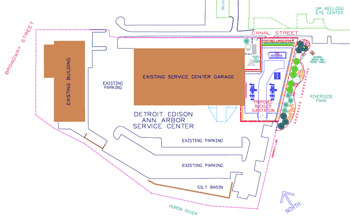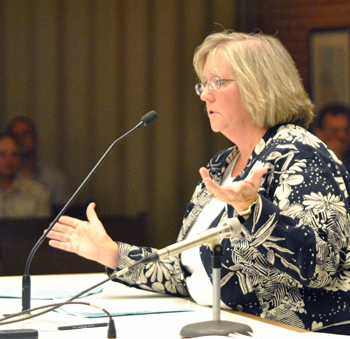Ann Arbor planning commission meeting (June 5, 2012): Planning commissioners acted on two items at their recent meeting that have implications for the city’s future energy use: A proposal for a new DTE Energy substation, and recommendations for a set of sustainability goals.

Erica Briggs is ending her term on the Ann Arbor planning commission at the end of June, and is not seeking reappointment. At the June 5 meeting, she lobbied unsuccessfully to postpone a DTE Energy project, arguing that the community needs a broader discussion about whether providing unlimited energy fits the city’s long-term goals of energy reduction.
The estimated $10 million project by DTE to build a new electrical substation was met with caution by commissioner Erica Briggs, who urged her colleagues to postpone the proposal. DTE is building the substation to meet increased energy demands in the city.
The project – called the Buckler substation – had previously been discussed at the commission’s May 15, 2012 meeting, which Briggs did not attend. When the item came up again at the June 5 meeting, she argued that a broader conversation about the community’s energy needs is needed. It’s a rare opportunity for that, she noted, given that projects like this don’t occur frequently – the last Ann Arbor substation was built in the 1960s. She used an analogy to transportation: If a proposal came in to widen all the roads in the community, that idea wouldn’t automatically move forward – because people would stop to discuss whether this is what they want for the city. The DTE project will essentially widen the energy capacity for the city, she said, at a time when the community is talking about the need to reduce its energy use.
As examples, Briggs noted that the city is moving forward with sustainability goals, as well as with a climate action plan. Later in the meeting, the commission unanimously recommended approval of 16 sustainability goals, including three that relate to climate and energy. One of the goals calls for the city to “reduce energy consumption and eliminate net greenhouse gas emissions in our community.”
Briggs made a motion to postpone the substation proposal, but it died for lack of a second as none of the other commissioners at the meeting were supportive of another postponement. A possible ally on the issue – commissioner Bonnie Bona, who works for the nonprofit Clean Energy Coalition – did not attend the June 5 meeting. The project was approved on a 5-1 vote, with Briggs dissenting and three commissioners absent. It does not require further approval by city council.
Another proposal that had been postponed from an earlier meeting in May – Maple Cove Apartments & Village development – was taken up again on June 5. The two apartment buildings and seven single-family homes are proposed at 1649 N. Maple, north of Miller Road between North Maple and Calvin Street on the city’s west side. Safety concerns over two planned entrances off of North Maple had caused the previous postponement, but planning staff reported that the entrances conform to city code.
Two residents of Calvin Street spoke during a public hearing, both of them objecting to the project. Several commissioners also expressed disappointment in the project, as they had at earlier meetings. But they noted that because it conforms to the city’s ordinances, they had no choice but to approve it. Briggs said it pointed to the need to reexamine some problems in the city code that led to this situation. The commission’s unanimous recommendation of approval will be forwarded to city council for consideration.
The vote on a project located near Maple Cove – a proposed Speedway gas station at the northeast corner of Maple and Miller – was postponed by commissioners. City planning staff had recommended postponement, to allow the owner to make requested revisions in a landscaping plan and traffic impact statement.
Two other requests were approved, both related to rezoning of land acquired by the city: (1) two parcels for an expansion of the Bluffs Nature Area, and (2) a site adjacent to the Bryant Community Center. In both cases, commissioners recommended that city council rezone the sites to PL (public land). [Full Story]






